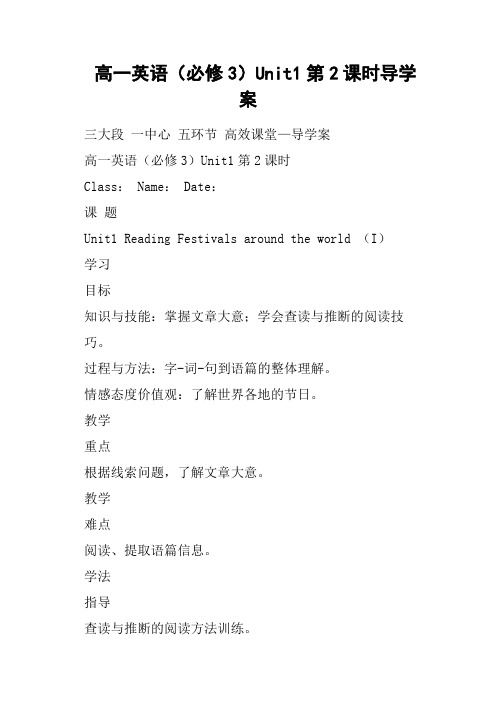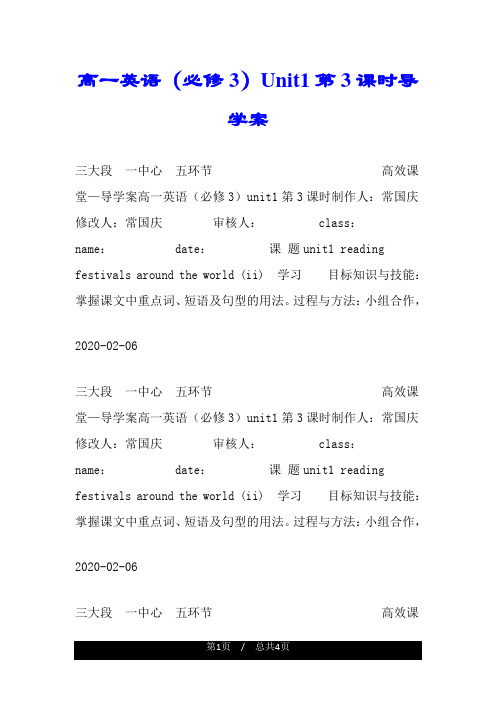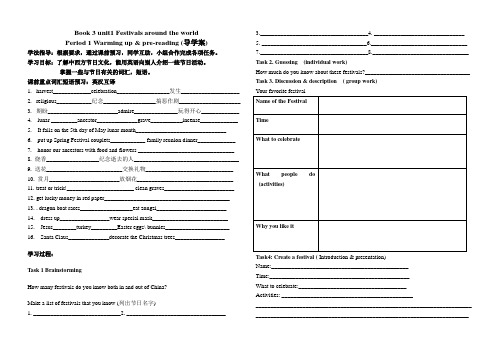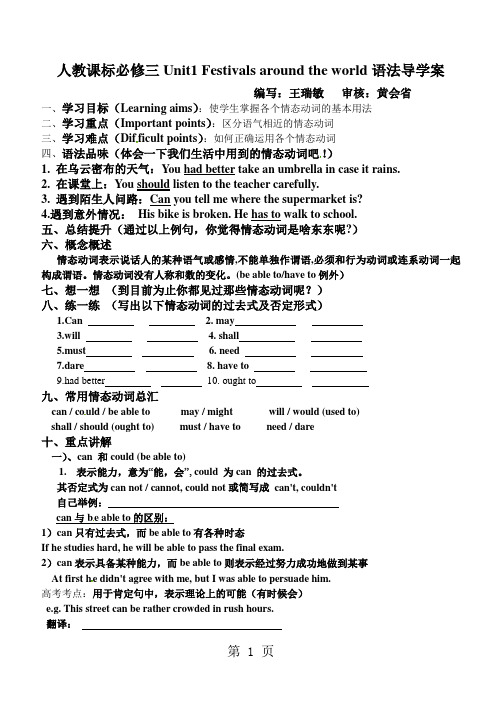必修三unit1导学案3(最新整理)
高一英语必修3Unit1第2课时导学案

高一英语(必修3)Unit1第2课时导学案三大段一中心五环节高效课堂—导学案高一英语(必修3)Unit1第2课时Class: Name: Date:课题Unit1 Reading Festivals around the world (I)学习目标知识与技能:掌握文章大意;学会查读与推断的阅读技巧。
过程与方法:字-词-句到语篇的整体理解。
情感态度价值观:了解世界各地的节日。
教学重点根据线索问题,了解文章大意。
教学难点阅读、提取语篇信息。
学法指导查读与推断的阅读方法训练。
学习过程一.自主探究——问题发现自我检测:阅读课文Pre-reading和Reading部分,做下列习题。
1) 翻译句子并背诵下列句子, 注意you think在句中的作用。
Discuss in pairs what kindation you think will be introducedassage._________________________________________________ _________________2) 完成课后ding练习1。
3) 根据课文内容,回答下列问题。
(1)How many kindvals adxt ?A. 5 BC. 3 D. 6(2) Wllowing is NOT a festivaldead ?_________.A. the DaDeadB. ObDragon Boat Festival D. Halloween(3) What do people usually do during Harvest Festivals?A. to decorate churches and town halls with flowers and fruitB. to eat dumplingand meaget togave meals.D. to ad(4) Whaxt mainly about ?A. A bduvals.B. Avals.C. what people do during festivals.D. How to celebraval.二.合作探究——问题生成与解决问题1:复习新单词(take place—custom)问题2:在课文中找出下列短语,翻译并背诵下列短语。
高一英语(必修3)Unit1第3课时导学案.doc

高一英语(必修3)Unit1第3课时导学案三大段一中心五环节高效课堂—导学案高一英语(必修3)unit1第3课时制作人:常国庆修改人:常国庆审核人: class:name: date:课题unit1 reading festivals around the world (ii) 学习目标知识与技能:掌握课文中重点词、短语及句型的用法。
过程与方法:小组合作,2020-02-06三大段一中心五环节高效课堂—导学案高一英语(必修3)unit1第3课时制作人:常国庆修改人:常国庆审核人: class:name: date:课题unit1 reading festivals around the world (ii) 学习目标知识与技能:掌握课文中重点词、短语及句型的用法。
过程与方法:小组合作,2020-02-06三大段一中心五环节高效课堂—导学案高一英语(必修3)unit1第3课时制作人:常国庆修改人:常国庆审核人: class:name: date:课题unit1 reading festivals around the world (ii) 学习目标知识与技能:掌握课文中重点词、短语及句型的用法。
过程与方法:小组合作,2020-02-06三大段一中心五环节高效课堂—导学案高一英语(必修3)unit1第3课时制作人:常国庆修改人:常国庆审核人: class:name: date:课题unit1 reading festivals around the world (ii) 学习目标知识与技能:掌握课文中重点词、短语及句型的用法。
过程与方法:小组合作,2020-02-06三大段一中心五环节高效课堂—导学案高一英语(必修3)unit1第3课时制作人:常国庆修改人:常国庆审核人: class:name: date:课题unit1 reading festivals around the world (ii) 学习目标知识与技能:掌握课文中重点词、短语及句型的用法。
新人教版高中英语必修三整册导学案

高一英语必修三导学案Unit 1 Festivals around the world 单元要点预览(旨在让同学整体了解本单元要点)语言要点(模块)Ⅰ.词语辨析(旨在提供完形填空所需材料)Ⅱ.词性变化(旨在提供语法填空所需材料)Ⅲ.重点词汇(旨在提供词汇综合运用所需材料)1. mean (meant, meant) vt.&vi. 意思是;意味着;打算;预定[典例]1). The sign means that the road is blocked. 这个标志表示此路不通。
2). What do you mean to do with it? 你打算把它怎样处理?3). I mean you to work as our spokesman. 我想请你当我们的代言人。
[重点用法](sth.) mean doing sth. 意味着…(sb) mean to do sth. 打算做…had meant to do sth. 本来打算做某事be meant for 打算作……用;打算给…(sth.) be meant to do sth. 被预定/指定/认为做某事What do/did you mean by...? “你……是什么意思?”[练习] 按要求填空或翻译。
1). Can you tell me what this sentence______ (mean)?2). Your friendship ______ (mean) a great deal ______ (介词) me.3). In some parts of London, missing a bus means ______ (wait) for another hour.4). What did he mean ______ (介词) saying that remark?5). I ______ ______ ______ ______(本来打算来)yesterday, but I had an unexpected visitor.6). 这些房间是打算用作少年活动中心的。
必修3 unit1period 1 导学案

Book 3 unit1 Festivals around the worldPeriod 1 Warming up & pre-reading (导学案)学法指导:根据要求,通过课前预习,同学互助,小组合作完成各项任务。
学习目标:了解中西方节日文化,能用英语向别人介绍一些节日活动。
掌握一些与节日有关的词汇,短语。
课前重点词汇短语预习:英汉互译1.harvest_____________celebration__________________发生____________________2.religious____________纪念__________________搞恶作剧_____________________3.期盼________________________admire_______________玩得开心_____________4. lunar _________ancestor______________grave___________incense_____________5. It falls on the 5th day of May lunar month_______________________________6. put up Spring Festival couplets____________ family reunion dinner_____________7. honor our ancestors with food and flowers _________________________________8. 烧香__________________纪念逝去的人____________________________________9. 送花__________________________交换礼物______________________________10. 赏月________________________放烟花_________________________________11. treat or trick!_______________________ clean graves________________________12. get lucky money in red paper___________________________________________13. . dragon boat races__________________eat zongzi________________________14. dress up_________________wear special mask__________________________15. Jesus________turkey_________Easter eggs\ bunnies______________________16. Santa Claus______________decorate the Christmas trees_________________学习过程:Task 1 BrainstormingHow many festivals do you know both in and out of China?Make a list of festivals that you know (列出节日名字)1. ______________________________2. __________________________________3._____________________________________4. _______________________________5. ____________________________________6._________________________________7._____________________________________8._________________________________ Task 2. Guessing (individual work)How much do you know about these festivals?____________________________________ Task 3. Discussion & description ( group work)Task4: Create a festival ( Introduction & presentation)Name:_______________________________________________Time:________________________________________________What to celebrate:_____________________________________Activities: _______________________________________________________________________________________________________________________ _________________________________________________________________________Task 5. Summary (match them)The Middle-autumn Day Festivals of the DeadTomb-sweeping DayThe Spring Festival Festivals to honor peopleDragon Boat FestivalHalloween Harvest FestivalsEasterThanksgiving Day Spring FestivalTask6. Homework: 写一篇介绍春节或中秋节的小短文。
人教版高中英语必修三Unit 1《Festivals aroun d the world》word导学案3

第三册第一单元第五课时 Using Language语言点导学案编号5BOOK3 Unit 1 Festivals around the worldUsing languageStep 1 Leading-inLet the students listen to English song “Love story”.Step 2 Readin g and thinking1.turn up出现,到场;调高(音量) turn away不准进入;拒绝;打发走turn________拒绝;(声音等)调小 turn________打开turn ________关掉 turn ________生产,制造;证明是;结果是turn over________ turn in 上交, 交还turn a blind eye to 对 ... 视而不见turn________sb for sth转向某人寻求某物as it turned out果然如此(1)The hall was full, and hundreds of fans had to be turned away .(2) Don’t do any other things while you are doing your homework. Soplease__________your MP3.(3) When you are______________ (处于困境中), you can________me for advice.2. ______ one’s word 守信用_______one’s word失信(1) I am a man who always keeps my word, so you can believe in me.(2) Don’t break your word, otherwise, no one will trust you.(3) My father said he would_______his word and came to attend the teacher-parent meeting,but he _______his word, which annoyed me.注意: keep one’s word和break one’s wo rd中的名词word不能用复数形式。
人教课标必修三Unit1_Festivals_around_the_world语法导学案

人教课标必修三Unit1 Festivals around the world语法导学案编写:王瑞敏审核:黄会省一、学习目标(Learning aims):使学生掌握各个情态动词的基本用法二、学习重点(Important points):区分语气相近的情态动词三、学习难点(Dif ficult points):如何正确运用各个情态动词四、语法品味(体会一下我们生活中用到的情态动词吧!)1. 在乌云密布的天气:You had better take an umbrella in case it rains.2. 在课堂上:You should listen to the teacher carefully.3. 遇到陌生人问路:Can you tell me where the supermarket is?4.遇到意外情况:His bike is broken. He has to walk to school.五、总结提升(通过以上例句,你觉得情态动词是啥东东呢?)六、概念概述情态动词表示说话人的某种语气或感情,不能单独作谓语,必须和行为动词或连系动词一起构成谓语。
情态动词没有人称和数的变化。
(be able to/have to例外)七、想一想(到目前为止你都见过那些情态动词呢?)八、练一练(写出以下情态动词的过去式及否定形式)1.Can2. may3.will4. shall5.must6. need7.dare 8. have to9.had better 10. ought to九、常用情态动词总汇can / co uld / be able to may / might will / would (used to)shall / should (ought to) must / have to need / dare十、重点讲解一)、can 和could (be able to)1.表示能力,意为“能,会”, could 为can 的过去式。
必修3Unit 1 导学案
高一年级英语学科导学案必修三Unit 1 Festivals around the world设计者:曾令明审核者:高一年级备课组【总1】必修三Unit 1第一课时导学案Teaching contents: Words and expressionsTeaching Aims:Learn the new words and expressionsTeaching Important points:The pronunciation and the use of the wordsTeaching Difficult points:The use of some important words and expressionsTeaching Procedures:★ StepⅠ .Read the new words★ StepⅡ .Language points:★1.take place 发生;举行. [ 常指按计划、安排进行的事情 ,也可指不在计划之内所发生的事情,不用于进行时和被动语态]①The evening party will take place on Sunday.②When will the wedding take place ?拓展:take place、 happen、 occur、 break out 的用法区别:以上表“发生”的动词(词组),均为不及物动词(词组),不用于被动语态。
take place:一般指经过安排的正式的事。
如:The film festival will take place in November in shanghai.happen:指事先无计划的“偶然发生”或者“碰巧发生”,常用句型:Sth. happen to sb. 某人发生某事happen to do sth. happen to be doing sth.happen to have done sth. It happens that …如:The car accident happened last week.occur: “发生”“想起”,常用句型:Sth. occurs to sb. 某人突然想到……相当于:It occurs to sb. that …如:It suddenly occurred to me that I should call him up to make an appointment with him.break out: 指战争、火灾、疾病等的“突然爆发”。
最新人教版高中英语必修三导学案(全册_共5个单元_35页)
最新人教版高中英语必修三导学案(全册_共5个单元_35页)最新人教版高中英语必修三导学案(全册共5个单元)新课标人教版 Unit 1 Festivals around the world世界各地的节日核心词汇1.All of us____________(钦佩)the three year old boy named Lang Zheng for his bravery.2.The____________(可能性)that the majority of the labor force will work at home in the near future is often discussed.3.The Nobel Prize is____________(授予)to those who make great contributions in many fields every year.4. Football fans without tickets____________(聚集)around the TV in the corner of the bar to watch the World Cup.5.Wherever you work,you will____________(获得)much valuable experience as long as you are willing to work.6.David____________(道歉)for having kept us waiting for hours outside. 7.When I returned,there was a note on the table,____________(使想起)me about Jane’s birthday that night.8.____________(原谅)me,but I’m busy at the moment;I can’t go out with you. 9.用believe的适当形式填空(1)People all over the world hold the____________that the economy will soon recover and life will improve.(2)At first people refused to____________such a thing(to be)possible.10.(1)Among the most common illegal acts are fishing without____________and catching more than the limit?(permit)(2)Since you have a____________,would you like to go fishing if time____________.(permit)1.admire2.possibility3.awarded4.gathered5.gain6.apologized7.reminding8.Forgive9.(1)beliefssion (2)believe10.(1)permission (2)permit;permits高频短语1.________________ 发生2.________________ 纪念;追念3.________________ 盛装;打扮;装饰4.________________ 搞恶作剧;诈骗;开玩笑5.________________ 期望;期待;盼望6.________________ 日夜;昼夜;整天7.________________ 好像8.________________ 玩得开心9.________________ 出现;到场10.________________ 守信用;履行诺言11.________________ 屏息;屏气12.________________ 出发;动身;使爆炸13.________________ 使……想起……1.take place 2.in memory of 3.dress up 4.play a trick on 5.look forward to 6.day and night 7.as though 8.have fun with 9.turn up 10.keep one’s word 11.hold one’s breath 12.set off 13.remind...of...重点句式1.At that time people would starve if food____________,especially during the cold winter months.在当时,如果食物难以找到,人们就会挨饿,特别是在寒冷的冬季。
高一英语必修三unit1导学案
Language points:1. starve(vi饿死;挨饿;渴望;急需要) (vt.使饿死,使挨饿)starve for sth. 极需要…starve to do sth. 渴望去做…starve to death 饿死be starved to death饿死2. gain vt.&vi.获得;得到;获益;(钟表)走得快;增加3. award (1)n. 奖品;奖状win/ receive an award 获得奖赏(2)vt. 授予,奖于,给予award sb. sth. (for sth.)award sth. to sb. 授予某人某物be awarded sth. for (sth.)4. admire vt. 赞美;钦佩;羡慕;夸奖5. energetic adj. 精力充沛的;精神饱满的;积极的energy n. 精力;力气;[U]能量be full of energy 精力充沛6. custom n. (1)习俗;风俗;惯例(2)习惯(3)custom用作复数,意为“关税”“海关”7 take place, 发生,举行,常指事先安排,计划发生的事情。
happen, 发生,常指事先无计划地,偶然地发生的事。
break out,(火灾,战争,疾病)突然发生。
8. in memory of 纪念,追念in honour of 为向。
敬意;纪念。
in search of 寻找in charge of 负责;掌管in control of 控制9.dress up 盛装;打扮;装饰dress up as…装扮成。
,打扮成。
dress oneself 自己穿衣be dressed in 穿着……(表示穿着的状态)10.play a trick on 搞恶作剧;诈骗;play tricks on sb 捉弄某人make fun of sb 取笑某人play a joke on sb 取笑某人laugh at sb 嘲笑某人11.look forward to 期望,期待,盼望,(其中to是介词,后跟名词,代词,动名词)12.have fun with 玩的开心for fun\for the fun of 取乐,非认真地,当笑话make fun of 嘲弄,取笑It is fun to d o∕doing sth.做某事有趣What fun!多么有趣!13.either…or要么。
必修三 unit1 导学案
Book 3 Unit1 Festivals around the world(Reading)班级:姓名:Step One: Leading in. (情景导入)一.Which festival does the song/picture remind you of?Step Two: Learning while guiding. (学导结合)二.Fast Reading.(1).Divide the article into three parts and match the main idea .Part 1: Introduction Introduce four kinds of festivals.Para.__________Part 2: Body The reasons why people are crazy about festivals.Para.__________Part 3: Conclusion The origins of festivals.Para.___________三.Careful Reading.(1).Read paragraph one quickly and fill in the blanks. (Para.1)There are all kinds of festivals and_________ around the world, which have many _________, some ____________, some __________, and some for special _________ or ________.(3).Answer the question. (Para.6)Can you tell me the reasons why people are crazy about festivals all over the world?_______________________________________________________________________________ ______________________________________________________________________________.Step three: Further studying and exploring. (探究深化)四.Answer the following questions.(2).What should we do to inherit(继承) and carry forward(发扬) our traditional culture?A suggestion:ChinaWe should attach importance to(重视) traditional festivals of our country. Because we are Chinese, we should be proud of our customs and value our cultures, so it is a duty for us to make foreigners know about them, respect(尊重)them and spread(传播)them to the world.Background knowledge of festivals(有关节日的背景知识) Spring Festivals(春节):It takes place on the eve(前夜) of the 1st lunar ['luːnə](农历) month. It is held tolook forward to the end of winter and the coming of spring. During the Spring Festival in China, people eat dumplings, fish and meat and may give children lucky money(压岁钱)in red paper(红包).There are dragon dances(舞龙)andcarnivals ['kɑːnɪv(ə)l] (狂欢)and families celebrate the Lunar New Year together.Chinese people want their family members and friends to be healthy and lucky during next year.Mid-Autumn Day(中秋节):It takes place on the 15th day of the 8th lunar ['luːnə](农历) month .It is held to celebrate that the food is gathered ['gæðə](收集)for winter and the agricultural [æɡrɪ'kʌltʃərəl](农业的) work is over. On that day, people may gettogether ,admire the moon(赏月) and enjoy mooncakes(月饼).Chinese peoplevalue this festival for its important meaning of “reunion[riː'juːnjən](团圆)”. Dragon Boat Festival(端午节):It is held on the 5th day of the 5th lunar ['luːnə](农历) month, usually in June. It is held to honor Qu Yuan who was the famous ancient poet. On that day, peoplemay eat rice dumplings(粽子)and watch the dragon boat races(赛龙舟). Obon(盂兰盆节):It takes place in the middle of August. It is held to remember one’s deceased [di’si:st](已故的) relatives[ˈrelətiv] (亲属),but now it is also meant to be ajoyful time to celebrate life. On that day, people should go to clean graves [ greiv ](坟墓) and light incense[ in'sens ] (熏香),they also light lamps (灯)and play music because they think that this will lead the ancestors [ 'ænsəstə ] (祖先)back to earth.Halloween(万圣节前夜):It takes place on the night of October 31.It is held to honor the dead; it also had its origin in old beliefs about the return of the spirits of the dead people. It is now achildren’s festival, when they can dress up and go to their neighbors’ homes to ask for sweets. If their neighbors’ do not give any sweets, the children might play a trick on them.The Day of the Dead(亡灵节):day, people eat food in the shape of skulls and cakes with “bones” o n them. They offer food, flowers and gifts to the dead.Columbus Day(哥伦布日):Mohandas Gandhi Day(甘地纪念日):It takes place on the second day in October each year. It is held to honor Mohandas Gandhi who helped gain India’s independence [ɪndɪ'pend(ə)ns](独立) from Britain.Thanksgiving Day(感恩节):It is usually on the fourth Thursday in November. People are grateful because their food is gathered['gæðə](收集)for the winter and the agricultural [æɡrɪ'kʌltʃərəl](农业的)work is over. Now in the US, it is a time for family reunion[riː'juːnjən](团圆)”. In European countries, people will usually decorate ['dekəreɪt](装饰)churches and town hall with flowers and fruit, and will get together to have meals.Easter(复活节):It is on a Sunday in late March or early April. It is held to celebrate the return of Jesus from the dead and the coming of spring and new life.Easter egg (彩蛋)and Rabbit(兔子)are symbols of the most typical. Now every Easter, the United States the total size of a candy shop (美国大小糖果店)to sell chocolate made with the Easter Bunny(复活节小兔)and eggs.Cherry Blossom Festival (樱花节) :It takes place on March 15 to April 15 every year.People take up the relatives, inviting up the friend, holding wine and food to descend to seat on the floor in the plum flower tree, the side appreciates a cherry, side to drink to heart's content, is really a life is one great fun.Book 3 Unit 1 Festivals around the world(Writing)【题目】假如你是李华,你的美国笔友Mike将随其父母来中国,并在中国度过端午节。
- 1、下载文档前请自行甄别文档内容的完整性,平台不提供额外的编辑、内容补充、找答案等附加服务。
- 2、"仅部分预览"的文档,不可在线预览部分如存在完整性等问题,可反馈申请退款(可完整预览的文档不适用该条件!)。
- 3、如文档侵犯您的权益,请联系客服反馈,我们会尽快为您处理(人工客服工作时间:9:00-18:30)。
必修三Unit 1 Festivals--- Guidance 3 to SS’ Studying
1.learn language points of A Sad Love Story and master them through practice
2.master 19 key words , 14 phrases and 5 difficult points
一.课前预习:学会12 个单词,5 个短语,熟读P7 A Sad Love Story
1.单词表上12 个词1 worldwide 2 fool 3 permission 4 fashion 5. apologize
6.obvious
7.remind
8.forgive
9.wipe 10.drown 11.prediction 12.parking 2.生词表上短语5 个:1 turn up 2 keep one’s word 3 hold one’s breath 4 set off 5 remind…of…二.难点聚焦:5 个
A.P15, L16--a bit thinner L17—much happier
比较级的构成和比较级的修饰词——“一些很多相当远,甚至还要多一点”
1.她越来越健康,她比我们开心得多。
2.小李很聪明,小张远比他聪明。
3.你不戴眼镜看起来好得多。
B.P14,L 2—look forward to sth/doing sth
look forward to 意思是,其中的to 是词性,后接动词时用.
1.I am looking forward to (hear) from you now.
2.我期盼你早点回来。
3 我们期盼的考试到来了!
C.P14 首句:a week later, …he felt happier.
later…后,…以后/late 晚点,迟到
1.飞机晚点了三个小时。
2.三年后,他失败了。
D.It will be/take +时段+before+一般现在时句子—要过一段时间才能…
It was/took+时段+before+一般过去时句子—过了一段时间事情发生了
1.过了三年,他们结婚了。
2.要过半年,我们才是高二学生。
3.要不了多久他就会康复。
E.确定more than/rather than/other than 的词义
more than:other than:rather than:三.知识网络构建:4 类
1.the other day:
过去时常用的时间词:
2.cut down 词义:
其他和cut 有关短语
3.before long:
long before:
4.marry 有关短语:
5.benefit from:
四.当堂检测:30 分
1.1’×10 个单词:弱点缺点维生素合作债务
益处怒视咨询限制纤维结合2.2’ ×10 个短语1 谋生 2 欠债 3 增肥 4 受益于
5 期盼期待
6 the other day
7 砍伐削减
8.三天后9.rather than 10. 暗中监视;侦查
3.5’×2 个句子翻译
他靠砍柴谋生。
他不知道自己要过多久才能见到妈妈。
本节评价与反思:
我预习导学案情况打分:5,4,3,2,1;完成情况打分5, 4, 3, 2, 1 本节课我的精神状态打分:5,4,3,2, 1
我对自己本节课总体学习状况打分:5,4,3,2, 1
本节课我的收获打分:5,4,3,2, 1
下节课预习导学案我要改进:
下节课上课我要改进:
“”
“”
At the end, Xiao Bian gives you a passage. Minand once said, "people who learn to learn are very happy people.". In every wonderful life, learning is an eternal theme. As a professional clerical and teaching position, I understand the importance of continuous learning, "life is diligent, nothing can be gained", only continuous learning can achieve better self. Only by constantly learning and mastering the latest relevant knowledge, can employees from all walks of life keep up with the pace of enterprise development and innovate to meet the needs of the market. This document is also edited by my studio professionals, there may be errors in the document, if there are errors, please correct, thank you!。
